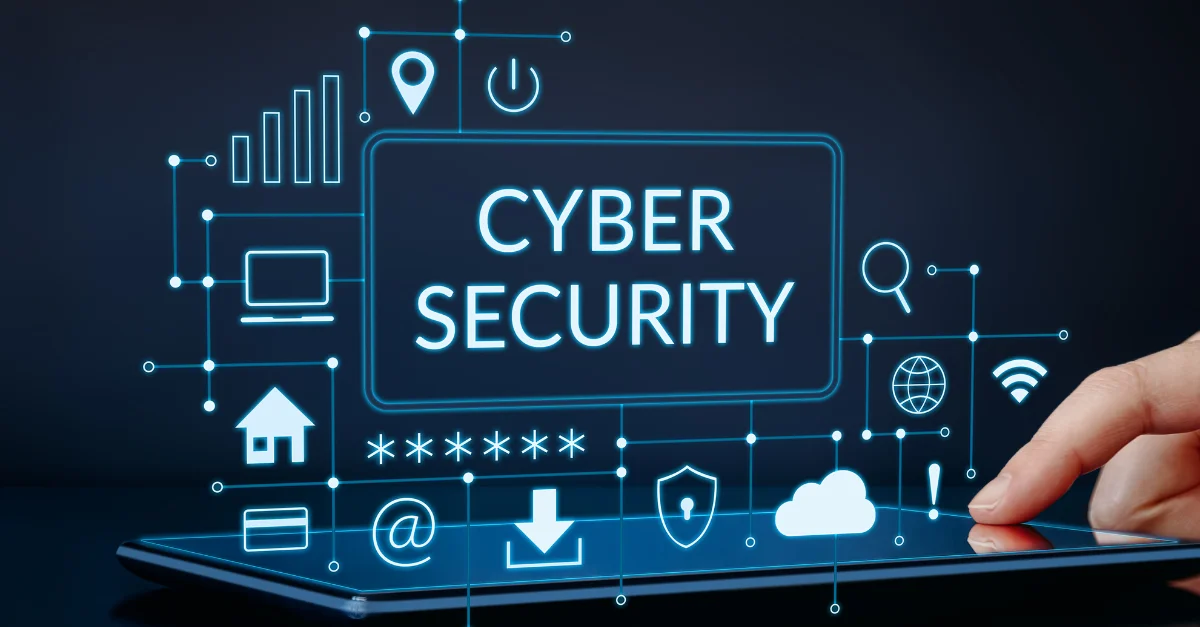What is Cybersecurity and Why is it Important for Your Company?
Cybersecurity has emerged as a crucial issue that businesses cannot afford to ignore in today’s digital environment when enterprises significantly rely on technology and the internet. Cybersecurity is the method of controlling undesirable access, stealing, and harm to computer systems, networks, and data. It includes a variety of policies, plans, and tools designed to protect confidential data, uphold privacy, and fend against online dangers. This article explores the value of cybersecurity for your organization, emphasizing potential hazards and providing practical advice to keep your operations safe.

The Increasing Threat Environment
The threat landscape has drastically changed in recent years as cybercriminals have advanced and become more persistent. Hackers use a variety of strategies, including malware, phishing assaults, ransomware, and social engineering, to exploit weaknesses in the networks and systems of your business. Data breaches, financial losses, reputational harm, and legal implications could all be caused by these cyber threats. You can better grasp the necessity for effective cybersecurity protection if you are aware of how serious these threats are.
Keeping Sensitive Data Safe
Your business probably manages a sizable quantity of sensitive data, such as trade secrets, financial information, intellectual property, and customer information. Without sufficient cybersecurity safeguards, sensitive data is susceptible to theft and unlawful access. Serious repercussions from a breach can include monetary loss, diminished customer trust, and regulatory problems. To protect this priceless data, it is essential to implement strict security procedures, encryption, access controls, and regular data backups.
Keeping the business running smoothly
Cyberattacks have the potential to seriously disrupt and halt business activities for your firm. Your firm could suffer greatly from a ransomware assault that encrypts your files or a Distributed Denial of Service (DDoS) attack that overwhelms your website. You may lower the danger of these assaults and guarantee the continuity of your business operations by investing in cybersecurity. Potential cyber incidents can be lessened by preventative measures such as network monitoring, incident response plans, and disaster recovery plans.
Developing Reputation and Trust
Trust and reputation are essential to the success of any business in the connected world of today. Customers, partners, and other stakeholders must have faith in your company’s ability to safeguard their data. A strong cybersecurity posture can set you apart from rivals and show your dedication to protecting sensitive data. By placing a high priority on cybersecurity, your company will gain a reputation for being dependable and trustworthy, which will help it acquire and keep key clients.
Regulatory Compliance is met
Companies must install suitable cybersecurity safeguards by several industry rules and data protection laws, including the General Data Protection Regulation (GDPR) and the California Consumer Privacy Act (CCPA). There may be serious fines and legal repercussions if these restrictions are broken. By taking proactive measures to manage cybersecurity risks, you assure compliance with applicable laws, shielding your business from possible fines and reputational harm.
Keeping Money From Losing Out
Cyberattacks could have a big financial impact on your business. Data breaches can come with astronomical costs, including forensic investigations, legal bills, notifying affected parties, and potential litigation. In addition, the harm brought on by lost intellectual property and economic interruption can persist for a very long time. By investing in cybersecurity, you may proactively lower your company’s risk of financial loss and eventual catastrophe.
Strengthening Employee Awareness
Increasing employee awareness of cybersecurity. Your staff can develop a culture of vigilance and accountability by participating in regular training sessions, phishing simulations, and discussions of your company’s security procedures.
Intellectual property protection
For many businesses, intellectual property (IP), which includes proprietary software, trade secrets, patents, and trademarks, is a significant asset. IP is a common target for cybercriminals seeking financial gain or a competitive edge. The intellectual property of your business is vulnerable to theft, duplication, or compromise without adequate cybersecurity protections. You may protect your priceless intellectual property from illegal access and theft by putting in place strong security mechanisms, such as access limits, encryption, and monitoring systems.
Protecting Your Reputation
An attack on your company’s cybersecurity could hurt its reputation. Rapidly disseminating information about a data breach or severe cyber incident can result in bad press, a loss of customer trust, and strained relationships with partners and stakeholders. Investing proactively in cybersecurity measures not only safeguards your business from potential intrusions but also indicates your dedication to safeguarding private data. You may prevent reputational harm and protect the faith and confidence of your clients and business partners by having a solid security posture.
The Function of Expert Cybersecurity Services
Given the complexity and ever-evolving nature of cyber threats, many businesses seek the expert cybersecurity services of cybersecurity firms to assure complete protection. These services provide expertise in vulnerability analysis, security audits, threat detection and prevention, and incident response. You may obtain specialist information and tools by working with trusted cybersecurity firms, which enables you to keep one step ahead of thieves.
Proactively exchanging threat intelligence
Proactive threat intelligence sharing is crucial to keep up with changing cyber threats. You can acquire important insights about new risks and attack trends by working with other enterprises, industry groups, and cybersecurity communities. You support the group’s defense against cybercriminals by providing knowledge about potential vulnerabilities, signs of compromise, and attack methods. Participate in information-sharing efforts, forums, and platforms for threat intelligence to expand your expertise and fortify your cybersecurity defenses.
Incident response and ongoing surveillance
Early detection and prompt response to potential cyber incidents depend on the implementation of a reliable continuous monitoring system. Utilize automated monitoring tools to examine system activity, log files, and network traffic for any unusual or suspicious activities. To efficiently address security issues, establish an incident response team with clearly defined roles and responsibilities. Create an incident response plan that details the containment, investigation, and recovery procedures to be used in the case of a breach.
Regular Penetration Testing and Security Assessments
To assess the efficacy of your cybersecurity measures, regular security assessments and penetration testing are necessary. Engage outside security professionals to mimic actual assaults and find weak points in your systems and networks. By performing these evaluations, you can find areas of vulnerability and take proactive steps to resolve them before thieves do. You may strengthen your entire cybersecurity posture and lower the likelihood of successful attacks by routinely evaluating and testing your security procedures.
Adopting a Security Culture
Technology is only one aspect of cybersecurity; your firm must also have a security-conscious culture. By incorporating cybersecurity knowledge into your company’s core principles, you may encourage a sense of accountability and ownership among your employees. Encourage employees to report potential security incidents and establish avenues via which they can get assistance and report shady activity. Share best practices and updates frequently to keep cybersecurity at the forefront of everyone’s thoughts.
Keeping Current with Emerging Threats
Being aware of the most recent trends and attack vectors is essential because cyber threats are continuously changing. Continually read security blogs, industry news, and reports from credible organizations focused on cybersecurity. Attend seminars, webinars, and training sessions to increase your expertise and stay current with new security techniques and technology. By being updated, you may modify your cybersecurity approach to successfully counter new and emerging threats.
Future Protection for Your Business
In the linked world of today, cybersecurity is essential to managing a successful company. Ignoring cybersecurity’s importance exposes your business to serious risks with potentially disastrous results. Sensitive information about your business can be safeguarded, operational continuity can be maintained, and your reputation can be preserved by investing in strong cybersecurity solutions, putting best practices into effect, and establishing a culture of security. Remember that maintaining your company’s cybersecurity involves continuing awareness, adaptation, and cooperation to remain ahead of cyber threats and secure its future.
Putting in Place a Comprehensive Cybersecurity Plan
A thorough cybersecurity strategy must be created and put into place if your business is to properly address its cybersecurity needs. This plan should include a variety of components and industry best practices that are tailored to the needs of your firm.
Here are key components to consider.
Evaluation of risks and management of vulnerabilities
Conduct a thorough risk assessment to find potential weaknesses and threats that are unique to your business. An evaluation of your network setup, systems, and data handling procedures should be part of this assessment. You may set priorities and dedicate resources to address the most serious issues by being aware of your vulnerabilities. Putting in place a vulnerability management program will assist in proactively identifying and fixing security flaws.
Network Security Architecture
It is essential to have a secure network architecture to safeguard the data and systems of your business. Build many layers of protection against illegal access using firewalls, intrusion detection systems, and secure gateways. Put in place robust access restrictions, such as two-factor authentication, to guarantee that only people with the proper authorization can access sensitive data. To fix any known security flaws, upgrade and patch your network hardware and software frequently.
Dependable data encryption
It is essential to encrypt sensitive data to protect its confidentiality, integrity, and validity. Use effective encryption techniques to safeguard data while it is in transit and at rest. Encrypting files, databases, emails, and any other communication routes that transfer sensitive information falls under this category. Even if an attacker manages to access the data, using encryption renders it useless without the decryption key.
Patching and System Updates Frequently
It is essential to keep your systems and software updated with the most recent security patches to avoid known vulnerabilities being exploited. Apply updates and patches frequently to improve system resilience and fix security problems in software. Implement a patch management procedure to make sure that updates are applied promptly to all computers and other devices in your network.
Employee Awareness and Training
Security issues can be avoided by educating your staff on cybersecurity best practices. To increase knowledge of typical dangers like phishing, social engineering, and malware, hold frequent training sessions. Teach staff members to spot phishing emails, stay away from dangerous links, and report any security incidents right away. By encouraging a culture of cybersecurity knowledge, you enable your staff to actively contribute to safeguarding the digital assets of your business.
Planning for business continuity and incident response
Create a thorough incident response strategy that describes what should be done in the event of a cybersecurity problem. Procedures for identifying, containing, and lessening the effects of a security breach should be included in this plan. Create a business continuity strategy that details how your organization will function both during and after a cyber event. To make sure these strategies are useful and effective, test and update them frequently.
Continuous Threat Monitoring and Analysis
You may recognize possible security issues as they arise and take immediate action by putting in place a reliable monitoring system. To spot suspicious activity and potential breaches, use log monitoring programs, intrusion detection and prevention systems, and security information and event management (SIEM) technologies. Utilize threat intelligence feeds and participate in industry information-sharing networks to stay up to date on the newest cybersecurity threats and trends.
Regular Security Assessments and Audits
Conduct regular security audits and evaluations to gauge how well your cybersecurity measures are working. These audits might find areas that need development as well as gaps and vulnerabilities. Engage outside security professionals to conduct impartial evaluations and penetration tests to find vulnerabilities that may have gone unnoticed within. Regular audits offer insightful information that can help you improve your cybersecurity approach.
In the digital age, cybersecurity is crucial for your company’s health. You can successfully protect your company’s sensitive data, ensure business continuity, and defend your reputation by being aware of the threats, putting in place a thorough cybersecurity strategy, and giving best practices a top priority.
Conclusion
Cybersecurity is no longer a choice in today’s digital environment, it is a requirement for every business. Cyber threats carry a high level of danger and may have far-reaching repercussions. By placing a high priority on cybersecurity, you may safeguard confidential information, guarantee business continuity, foster confidence, and adhere to legal obligations. Additionally, spending money on cybersecurity reduces financial losses, improves employee understanding, protects intellectual property, and lessens reputational harm. Keep in mind that maintaining cybersecurity needs regular awareness, updates, and adaptation to new threats. You can protect your company’s digital assets and lay the way for long-term success by remaining proactive and employing a thorough cybersecurity approach.
Cybersecurity is not a luxury, it is a requirement for any business doing business in the modern digital environment. Cyber threats provide significant and ubiquitous hazards, with the potential to have disastrous effects on enterprises of all kinds. You may greatly lower the danger of cyber events and safeguard your company’s priceless assets by comprehending the significance of cybersecurity, putting in place a thorough strategy, and taking a proactive approach. Recall that maintaining cybersecurity needs regular examination, adaptation, and investment. You are acting proactively to protect your company’s future success in the digital sphere by giving cybersecurity a top priority.


